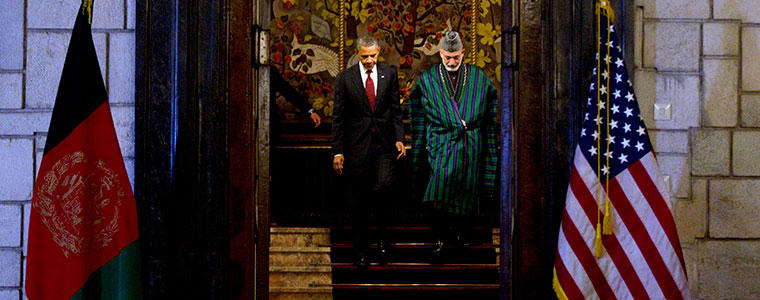Taking the Next Steps in Afghanistan

KABUL – The signing of the strategic partnership agreement between the U.S. and Afghanistan May 1 clarifies some essential questions on the security transition between the two countries in 2014. But with a presidential election expected the same year, the signing of the agreement points up the critical need to begin planning for the political transition as well.
The strategic partnership agreement, signed in the dead of the Afghan night between President Barack Obama and President Hamid Karzai, calls for "free, fair and transparent elections in which all the people of Afghanistan participate freely without internal or external interference." In principle, the inclusion of the line in the agreement illustrates that the U.S. and Afghan governments are committed to seeing a political transition by 2014, when the Afghan Constitution dictates Karzai must step down.
But that message isn't clear here in Kabul. As all actors confront the reality of departing troops, there is a pressing need to provide additional assurances that the international community will support Afghanistan in holding those free, fair and transparent elections. And many here don't believe that the international community will step up to support that political transition, or even that the government of Afghanistan is sincere in its commitments to actively prepare for and hold credible elections.
There is a distinct danger that if preparing for the presidential election is given short shrift, it could result in a strategic stumble as the international forces leave.
"We welcome how the strategic partnership agreement highlighted the importance of protecting and promoting shared democratic values and the holding of elections," said USIP's Andrew Wilder, director of the Institute's Afghanistan and Pakistan programs. "There is now an urgent need to build on this agreement, and to give the same degree of policy attention to laying the groundwork for a political transition as has been given to planning for the security transition."
A peaceful and democratic political transition in 2014 will greatly increase the prospects for a successful security and economic transition in 2014 and beyond, Wilder said during a trip here that happened to coincide with Obama's own visit.
Setting the conditions for an effective political transition is critical, agrees Shahmahmood Miakhel, a former deputy minister of the Interior, and USIP's Country Director in Kabul. "The stakes are very high this time because political instability will defeat security and economic transition," he says.
This stands to be the first time in Afghan history when a democratically elected president makes way for an electoral contest between non-incumbents.
Experts believe there must be a relatively level playing field for the elections, and a legitimate opportunity for candidates to express their views on the future of the country.
"We do not have a forum," says one observer of the political scene here. From a series of meetings with experts, NGOs, Afghan political observers and others in early May, it's clear there are several would-be candidates interested in running for president. But because of the uncertainty as to whether credible elections will be held such candidates have been reluctant to step forward. The political circumstances into which they would step are fraught with danger if the elections are not seen as legitimate. Many would like to see the Afghan government and international community bring more focus to the issue, giving confidence to potential candidates that it is safe to step up. Many Afghans believe a coalition should be formed to give legitimacy for individuals to step out as candidates.
"We don't really have strong alternatives," says the head of an Afghan-based NGO who spoke candidly during a meeting with USIP but whose name can't be revealed for fear of political retribution. "But form a coalition and bring [the candidates] together and you'll have one."
USIP is hosting an interagency elections working group that meets once a month in Washington. The group's aim is to discuss technical issues surrounding the election and to provide an opportunity to sharpen focus on the election. In 2009, technical glitches and poor planning contributed to a presidential election that was perceived as flawed.
"Given the significance of the election to Afghanistan's future stability, it is important that we avoid the mistakes of the past," says Scott Smith, USIP's deputy director of the Afghanistan program, who says the group focuses on "rational technical issues" where U.S. assistance might be required.
The ideal course is to focus on the election now, when there is still time to prepare it, and when a "real debate" can take place about Afghanistan's political future.
"Politics is happening," Wilder says, "and people are beginning to look for successors to President Karzai who they believe can ensure peace and stability in Afghanistan."
Watch Scott Smith discuss the upcoming political transition in Afghanistan:



